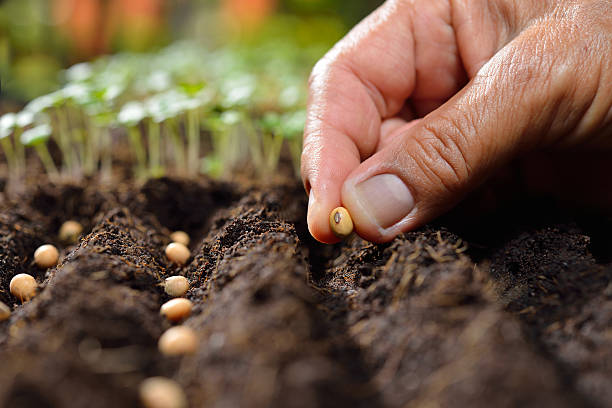
It's Throw Back Thursday!
Here's an excerpt from our newsletter posted back in January 2009
Reprinted with permission from High Mowing Organic Seeds (www.highmowingseeds.com)
Organic Seed is Better for the Environment
The importance of organic seed is often overshadowed by the importance of organic food; since food goes directly into our bodies, the methods by which it was produced feel more pertinent than the methods by which seed is produced. But whether or not seed crops are grown organically does have a significant impact on the environment and health of the surrounding communities.Most crops grown for seed take longer to mature than food crops – the plant must go through its entire life cycle before seeds are mature, and even then there is often a period of curing or drying before seeds are ready to harvest. This lengthy process results in a greater window of time during which any number of pests and diseases can destroy the seed crop. In conventional seed production, pesticides, and fungicides are applied, often at much higher levels than are allowable for food crops. As the Organic Seed Growers and Trade Association asks: ―Is it fair for those of us in organic agriculture to want our own farms and environments to be as free of toxins as possible, but expect seed production communities to carry a heavy toxic load so that we can plant cheap conventional seed?
Organic Seed is Better Suited to Organic
Growing Conditions
In the last 50 years, the majority of breeding work and development of new varieties has been done with conventional farming practices in mind. What does this mean for organic growers? It means that most varieties we plant have not been developed to thrive in the conditions under which we grow them. For example, in a conventional system, plants receive infusions of fertilizer delivered directly to the roots and are sprayed with a range of chemicals to protect from pests and diseases. While some conventional breeding programs do consider flavor, more often selections are based on traits like how fast it grows and how well it ships. In organic farming systems, on the other hand, nutrients come from complex fertilizers such as compost, so plants need vigorous roots to seek out dispersed nutrients in the soil. Organic growers useless and milder applications for pest and disease protection, so plants are required to provide more of their own defense. And, in organic variety selection programs, flavor and appearance consistently top the list of traits to evaluate. In recent years, more research has gone towards developing and evaluating varieties for organic farmers. High-quality organic seed comes from varieties that have proven themselves under organic conditions.Organic Seed Supports Organic Research
As more people use organic seed, the increased demand encourages more companies and universities to devote resources to research and development of organic varieties and allows continuous improvement of current organic varieties. When you buy organic seed, not only are you getting a ―safe seed‖ and one that is grown in organic conditions like your own farm or garden, but you are supporting the future of organics.Though this newsletter is from 2009. High Mowing Seeds is a company. Check out their website!

High Mowing Organic Seeds is committed to providing the highest quality, 100% organic seed to growers. When you buy organic seed, you have the assurance that the seed was grown without synthetic chemicals and you are supporting farms and companies that are committed to organic agriculture with your purchase. We know that there are much better ways to improve agriculture then genetic engineering and increasing chemical inputs and we choose to focus on "true progress" that leads to greater health for soils, farms and communities.

